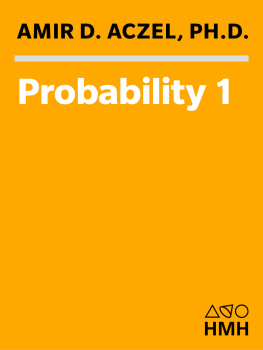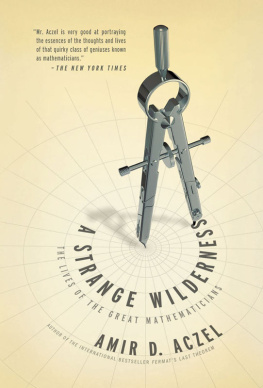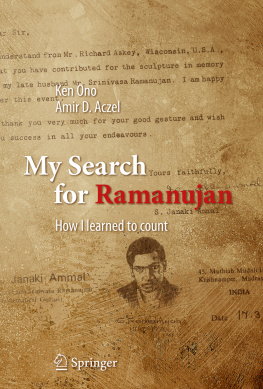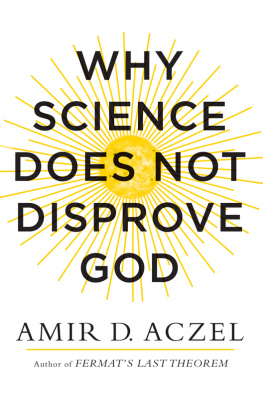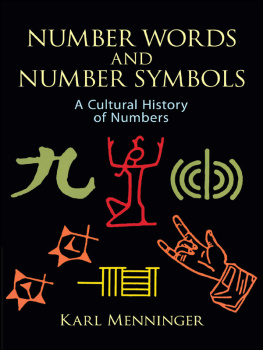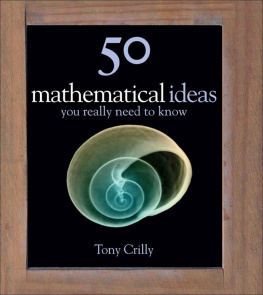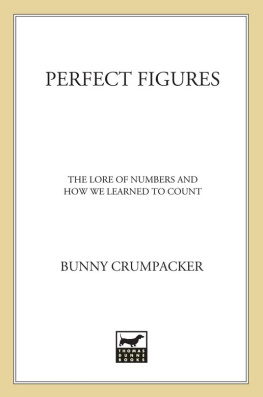Finding Zero
A Mathematicians Odyssey to Uncover the Origins of Numbers
Amir D. Aczel

The author and publisher have provided this e-book to you for your personal use only. You may not make this e-book publicly available in any way. Copyright infringement is against the law. If you believe the copy of this e-book you are reading infringes on the authors copyright, please notify the publisher at: us.macmillan.com/piracy .
For Miriam,who loves science
Contents
Introduction
The invention of numbers is one of the greatest abstractions the human mind has ever achieved. Virtually everything in our lives is digital, numerical, quantified. But the story of how and where we got these numbers we so depend on has been shrouded in mystery. This book tells the personal story of my lifelong obsession: to find the sources of our numbers. It briefly traces the known history of the very early Babylonian cuneiform numbers and the later Greek and Roman letter-numerals, and then asks the key question: Where do the numbers we use today, the so-called Hindu-Arabic numerals, come from? In my search, I explored uncharted territory, embarking on a quest for the sources of these numbers to India, Thailand, Laos, Vietnam, and ultimately to a jungle location in Cambodia, the site of a lost seventh-century inscription. On my odyssey I met a host of fascinating characters: academics in search of truth, jungle trekkers looking for adventure, surprisingly honest politicians, shameless smugglers, and suspected archaeological thieves.
When I entered first grade in the late 1950 s , at a private school in Haifa, Israel, called the Hebrew Reali School, I was asked a question the institution always asked its entering students. My teacher, Miss Nira, a young and pretty woman who smiled a lot and wore long, bright-colored dresses, inquired of each of us six-year-olds what we hoped to learn in school. One child said How to make money, and another, What makes trees and animals grow, and when my turn came, I answered that I wanted to learn Where numbers come from. Miss Nira looked surprised and paused for a moment, and then without a word turned to the little girl sitting next to me. I wasnt a precocious child who comes up with a question the teacher cannot addressI just had a most unusual childhood. And my answer to the teachers question was a direct result of an experience Id had during that special childhood.
My father was the captain of the SS Theodor Herzl, a cruise ship that sailed the Mediterranean at 21 knots, traveling from its home port in Haifa to the mythical islands of Corfu and Ibiza and Malta andoftento fabulous Monte Carlo. One of my fathers benefits as captain was the right to have his family join him on the ship whenever he wanted. We took advantage of this privilege very frequently, so that I ended up attending school only part of every year, making up for lost class time with tutors and self-study and, once back at school, by sitting for deferred exams.
As soon as the Theodor Herzl would arrive at the charmed principality of Monaco, with its magnificent palace perched on a rock over the Mediterranean, my father would drop anchor and a fast motorboat would ferry passengers and crew ashore. At night, many would head to the great Casino de Monte Carlo by the waters edge near the center of town. This was the undisputed high-class gambling capital of the world. But minors like me were forbidden entry into the famed gaming rooms, where princes and movie stars and celebrities still try to woo Lady Luck. So while the adults from our ship, including my parents, played at the roulette tables, I was entertained by ships stewards outside this white marble baroque palace surrounded by tall palm trees, bougainvillea, and white and red oleanders. There, my sister, Ilana, and I would run along the paths of this exuberant garden and play hide-and-seek among the fragrant bushes.
Ilana and I often fantasized about what it might be like inside this imposing building we thought we could never enter. Were people dancing? Were they eating fancy meals, as we often did aboard ship? We knew the adults played some kind of game insidethey always talked about it afterward on the shipbut what kind of game was it? We were dying to find out, and whispered about it between us.
And then one day it was my fathers personal stewards turn to take care of us on the periphery of the casino. Laci (pronounced lotzi), a Hungarian, concocted a scheme to take the girl of three and boy of five right inside the gaming halls. Laci was my favorite steward; the rest of them were boring middle-aged men who took care of us reluctantly (it wasnt really in their job descriptions). They were courteous and polite, but somewhat cold and formal. Whenever Laci took care of us, however, fun things would happen, and often rules of expected behavior were broken. The boy needs his mother immediatelyits an emergency! Laci hissed at the stern-faced, hulking, tuxedo-wearing bouncer at the door, and without waiting for an answer ushered us right inside the casino.
I was deathly worried about being kicked out. I knew the casino was taboo for us kids. But to my surprise nothing happened, nobody ran in to chase us away. I was dazzledon the ornately carpeted floor I saw large, elegant tables covered in green felt, and on each one a checkerboard of numbers in red and black and one very special, round circle of a number alone in green. The atmosphere was heavy with cigar and pipe smoke, and I struggled hard not to cough.
I was excited to see my parents seated at one table. But I knew I dare not disturb them. So I kept very quiet, and didnt move. I feared this dream-come-true might end any minute.
At the head of the table, across from the croupier, was my father, dapper in his black captains uniform displaying numerous British wartime decorations, and next to him my mother, stunning in a light blue evening dress. They were flanked by a US congressman from a southern state on one side and the famous French-Italian singer Dalida on the other, both VIPs traveling with us on this voyage. Other passengers were also seated around this table, and everyone was looking with rapt anticipation at a large black bowl at its center; at the bottom of the bowl was a spinning wheel.
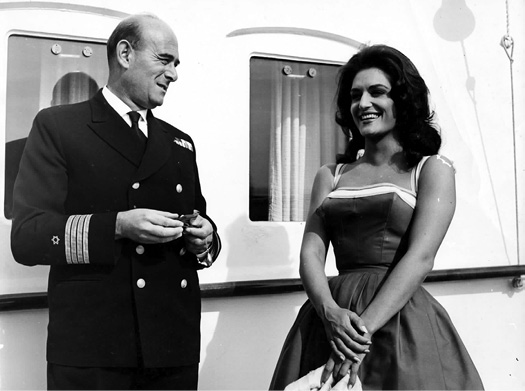
My father, Captain E. L. Aczel, with the French-Italian singer Dalida, aboard ship off the coast of Monaco, 1957.
Their attention seemed focused on a little white ball that had been flung into the bowl by a man in a short black coat, a white collared shirt, and a black bow tie. Laci kept inching us closer until we stood right behind my parents. This was so excitingto be at the heart of this magical activity forbidden to anyone younger than 21. Laci was holding my sister and me, each of us sitting on one of his arms; from our high vantage point above the table I could clearly see what was taking place below.
There was an eerie quiet as the ball twirled around in the bowl. I could hear every time it tapped a metal groove separating numbers at the bottom of the wheel, or when it struck one of the four diamond-shaped metal decorations above the numbers on the inner sides of the bowl, bouncing right back down whenever it did. I could feel the tension and anticipation. My father suddenly turned around when he noticed us, smiled knowingly at Laci, and then turned his attention back to the table.
Look, Laci explained to me in a whisper, you see, these are numbers on the table, and notice that every one of them is also on the wheel. Now watch what happens. I sat on his arm and stretched my neck forwardI did not want to miss a thing. The little ball was still bouncing around in the bowl, but more slowly now. Soon it would come to a stop. But where? On which number would it land? Laci told me the ball could choose only one number to land on, since every number was separated from its neighbors by metal dividers. I tried hard to guess where the ball would end up as the wheel slowed down further. I could now make out the separate numbers marked on its bottom.
Next page

